Sector-specific Cash and Voucher Assistance
CVA can help people in crises address their needs within a specific humanitarian sector, such as water, food, health, shelter, livelihood, or protection. Sector-specific CVA can be restricted or unrestricted, and conditional or unconditional, and will typically be provided as part of a comprehensive package which may also include in-kind and service-based assistance.
Each sector has to consider different questions, challenges, advantages and risks when it comes to supporting people’s recovery within their area of expertise. This requires evidence, tools, guidance and capacity. Meeting sector-specific outcomes through CVA also requires a multi-sectoral understanding of needs and of household economic security – see Multipurpose Cash Assistance. While some sectors are very experienced in implementing CVA and have done so for many years, others are now catching up. Most humanitarian sectors are committed and have been increasing their efforts on sector-specific CVA. The Global Cluster Coordination Group (GCCG) is also coordinating cross-cluster work to improve the sectoral used of CVA.
Current priorities
The CALP Network works closely with the cash technical groups/task teams within the global clusters, who have been defining their 2020 priorities and workplans during their regular meetings. A general overview and specific details of these priorities across each global cluster is available here.
Sector-specific CVA subpages
Camp Coordination, Camp Management and Cash and Voucher Assistance
Page
Find out more about Camp Coordination and Camp Management (CCCM) in relation to Cash and Voucher Assistance (CVA). For the most up to date information visit the Global CCCM Cluster’s website.
Education and Cash and Voucher Assistance
Page
A brief introduction as to how Cash and Voucher Assistance (CVA) can support education outcomes. For the most up to date information please visit the Global Education Cluster’s website.
Food Security and Cash and Voucher Assistance
Page
A brief introduction as to how Cash and Voucher Assistance (CVA) can support food security outcomes. For the most up to date information please visit the Food Security Cluster Cash and Market Working Group web page.
Health and Cash and Voucher Assistance
Page
The content on this webpage has been developed with the Global Health Cluster.
Nutrition and Cash and Voucher Assistance
Page
Malnutrition continues to pose a major challenge to human well-being around the world. In 2020, an estimated 144 million children under five suffer from stunting (i.e. chronic malnutrition) , 47 million children under five were wasted (i.e. acute malnutrition) , of which 14.3 million were severely wasted, and an additional 340 million suffered from micronutrient deficiencies (UNICEF/WHO/WB...
Protection and Cash and Voucher Assistance
Page
How can Cash and Voucher Assistance (CVA) support protection outcomes? Please find a brief summary below, and for the very latest information, refer to the Global Protection Cluster Task Team on Cash for Protection.
Shelter and Cash and Voucher Assistance
Page
How can Cash and Voucher Assistance (CVA) support shelter outcomes? Please find a brief summary below, and for the very latest information, refer to the Shelter and Cash Working Group.
WASH and Cash and Voucher Assistance
Page
How can Cash and Voucher Assistance (CVA) support WASH outcomes? Please find a brief summary below, and for the very latest information, refer to the WASH Cluster’s Cash and Markets Technical Working Group.
Latest

The Impact of Earned and Windfall Cash Transfers on Livelihoods and Conservation in Sierra Leone
Report
This study by Bulte et al. measures the impact of a cash transfer programme aimed at alleviating poverty and reducing pressure on the natural environment in Sierra Leone. Researchers offered aid to 91 rural communities, which are dependent on slash-and-burn agriculture in three forms: as windfall...

DFID Shock-Responsive Social Protection Systems research: Literature review
Report
DFID has commissioned research into Shock-Responsive Social Protection systems, to further understand the nature of the interaction between social protection, humanitarian and disaster risk management systems and ways in which long-term social protection systems can be scaled up to
provide support in...
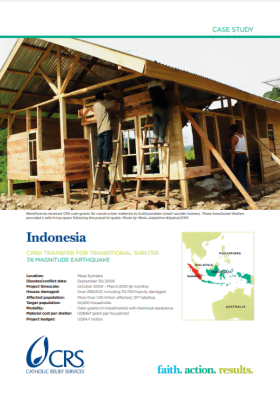
Using Cash for Shelter: Cash Transfer for Transitional Shelter
Case Study
An earthquake measuring 7.6 magnitude struck near the coast of West Sumatra, Indonesia, on September 30, 2009, affecting over 1.25 million people. Catholic Relief Services conducted rapid needs assessments in October 2009, identifying shelter as the most urgent need. Over 80 percent of the houses in some...

Cash and Markets In The WASH Sector
Report
Market based programming is increasingly heralded as having a critical place in the future of humanitarian programming. The proposed benefits of working through existing market systems include improvements to speed, efficiency and effectiveness of programming and increased beneficiary dignity and...
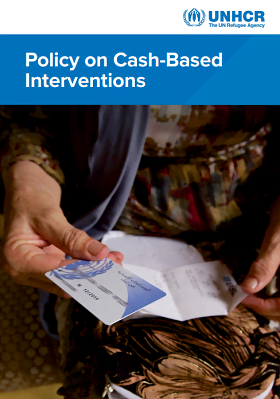
Policy on Cash-Based Interventions
Report
UNHCR’s Policy on Cash-Based Interventions (CBIs) is introduced herewith to expand and systematise the use of CBIs as a modality of assistance and service delivery across the organization and its operations worldwide. The Policy reconfirms UNHCR’s commitment to the increased use of CBIs and sets out...
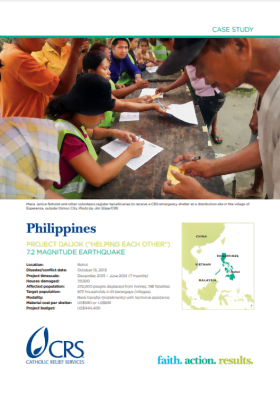
Using Cash for Shelter: Project Daijok ("Helping Each Other")
Case Study
After a major earthquake in the Philippines in October 2013, Catholic Relief Services reached 5,000 families with emergency shelter materials, water and hygiene kits, and emergency latrines. In November 2013, CRS staff conducted a housing and market assessment in three of the worst‑hit municipalities of...

IOM Cash-Based Transfer – Update and Case Studies
Report
Cash-based transfers have a long history in the support of people on the move. Cash or vouchers have been an element of the International Organization for Migration’s resettlement support for people moving to new countries, or returning to countries they had to leave. Increasingly over the last decade,...
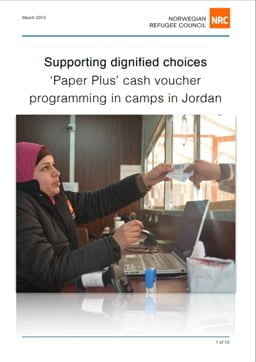
Supporting Dignified Choices ‘Paper Plus’ Cash Voucher Programming in Camps in Jordan
Report
The Norwegian Refugee Council (NRC) in Jordan has directly assisted close to 400,000 vulnerable Syrian refugees in both formal camps and host communities since it began operations in November 2012. NRC is the lead partner of UNHCR in Zaatari and Azraq camps in providing refugees with shelter and the...
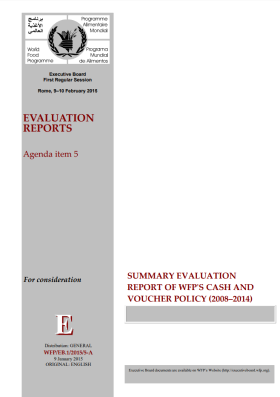
Summary Evaluation Report of WFP’s Cash and Voucher Policy (2008-2014)
Report
The WFP’s Summary Evaluation Report on cash and voucher policy (2008-2014) was commissioned by WFP’s Office of Evaluation in order to assess the quality and results of the policy and its implementation. The evaluation found that although the policy does not represent WFP’s current best...

Research on Food Assistance for Nutritional Impact (REFANI): Literature review
Report
The REFANI literature review identifies existing evidence on the use of Cash Transfer Programmes (CTPs) and the impact of CTPs on acute malnutrition in humanitarian contexts. The review is structured as follows: Section A discusses the global burden of acute malnutrition; Section B highlights...
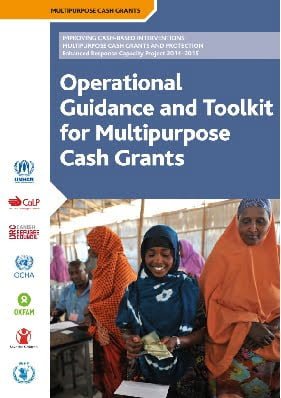
Operational Guidance and Toolkit for Multipurpose Cash Grants
Guidelines and Tools
This operational guidance and toolkit brings together worldwide expertise on cash-based interventions (CBIs). It provides comprehensive and practical guidance for humanitarian actors to assess the feasibility, conceptualise the design and structure the implementation of MPGs. The guidance focuses on...

Cash Transfer Programming for Syrian Refugees: Lessons Learned on Vulnerability, Targeting, and Protection from the Danish Refugee Council’s E-Voucher Intervention in Southern Turkey
Report
DRC Turkey is currently implementing a two-year, DFID-funded project that aims to provide immediate support to and strengthen the coping mechanisms of vulnerable non-camp Syrian refugees in southern Turkey. The first phase of the project focused on identifying and providing monthly cash transfers (in the...
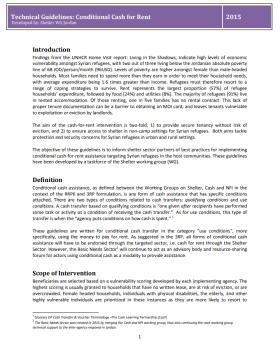
Technical Guidelines: Conditional Cash for Rent
Guidelines and Tools
The guideline was prepared by UNHCR Shelter Working Group in Jordan with the objective of informing shelter sector partners of best practices for implementing conditional cash-for-rent assistance targeting Syrian refugees in the host communities. The guide explores how to define the scope of a cash...

Philippines Haiyan Response – A multi-sectoral review of the use of market analysis and the design and implementation of CTPs
Report
Following Typhoon Haiyan, which hit the Philippines on November 8 2014, at least 45 aid agencies chose to implement Cash Transfer Programming (CTP) to assist the more than 16 million people affected. Cash transfers were a logical approach in a country with developed market systems, strong financial...

Value for Money of Cash Transfers in Emergencies
Report
The objective of this study is to analyse evidence on the Value for Money (VfM) of cash transfers. The study reviews evidence on the economy, efficiency and effectiveness of cash, vouchers and in-kind transfers, in order to support a more structured analysis of the VfM of different transfers. It is based...
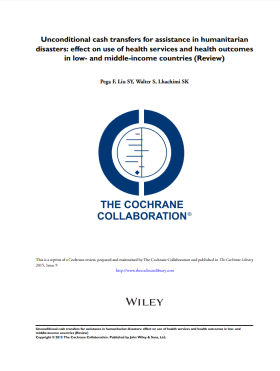
Unconditional Cash Transfers for Assistance in Humanitarian Disasters: Effect on use of health services and health outcomes in low- and middle-income countries
Report
Unconditional cash transfers (UCTs) for humanitarian assistance during disasters may improve health in low- and middle-income countries (LMICs) by giving recipients additional income. This study sought to assess the effect of UCTs on health services use, health outcomes, social determinants of health,...
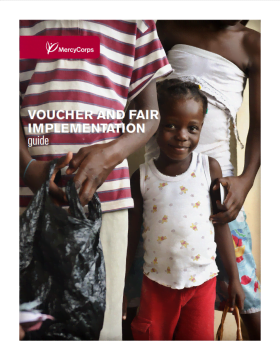
Voucher and Fair Implementation Guide
Guidelines and Tools
Mercy Corps’ Voucher and Fair implementation Guide provides clear, step-by-step guidelines for teams implementing cash, restricted cash, or commodity voucher programmes. Written for an internal audience, the Guide may also be useful for peer agencies.
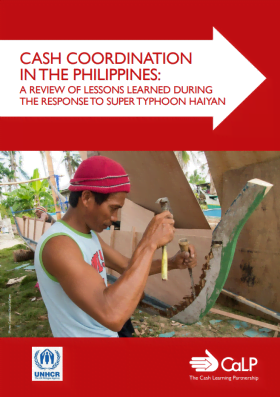
Cash Coordination in the Philippines: A review of lessons learned during the response to Super Typhoon Haiyan
Report
In the last five years there has been a growing trend towards the use of cash transfer programming (CTP) as a response modality in emergencies across the humanitarian sector. The fungibility of cash, when provided without restrictions, offers increased choice for affected populations to...

Cash in Emergencies Toolkit
Guidelines and Tools
Access Toolkit Here Cash transfer based programming (CTP) is an effective and flexible way to support people affected by emergencies, maintaining their dignity and choice, while fostering local economies. CTP includes all forms of cash and voucher-based assistance. The Cash in Emergencies Toolkit has been...

Electronic Cash Grants in Emergencies: Approaches and lessons learned
Report
Cash distributions in an emergency: A concept that seems so obvious today yet has only recently gained recognition within humanitarian response programming for its speed, efficiency and—above all—effectiveness.
This document provides a snapshot for humanitarian response peers on best practices,...


